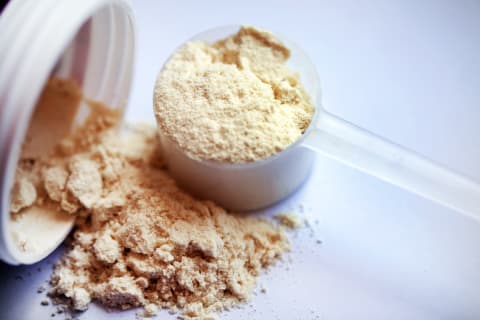Advertisement
The Gut-Healing Supplement You Never Knew You Should Be Taking

I can't say it enough: Your gut is the foundation for your overall health and well-being. A compromised gut has been linked to many modern health problems, including anxiety, depression, autoimmune conditions, and even cancer. One common misconception is that you have to be having gut symptoms—like diarrhea, bloating, food intolerances, and gas—to have gut dysfunction; that is simply not the case. About 22 percent of people with underlying digestive problems do not have any sort of obvious digestive symptoms.
So what happens when your gut health is out of whack? When your gastrointestinal tract is damaged, undigested food particles and toxins end up entering your bloodstream, leading to a cascade of chronic inflammation. Microbiome imbalances such as SIBO and candida overgrowth can also upset your gut and contribute to chronic health problems.
If you want to heal your body—start with your gut.
The good news is that when it comes to healing long-standing health problems—no matter what ails you—you can start by healing your gut. The total surface area of your gut is covered in a type of cell called an enterocyte. These cells continually regenerate so that every two to three weeks you generate an entirely new gut lining!
Because of this rapid regeneration, if you're dealing with non-chronic gut problems you can heal your gut in about 2 to12 weeks. But if you're dealing with a completely damaged gut along with other autoimmune-inflammation spectrum problems, it can take the average adult between 12 and 24 months to fully heal the gut and see sustainable changes.
There are many ways to approach gut healing. One very popular way is through supplementing with L-glutamine. You’ve probably seen L-glutamine supplements throughout vitamin and health food stores advertised as the perfect way to rebuild and repair muscle tissue, especially for athletes. This is the most abundant amino acid in your blood and is used in the biosynthesis of protein to be used throughout your body.

L-glutamine is all about repairing tissues in the body.
Because of its powerful ability to repair tissue, L-glutamine is categorized as a conditionally essential amino acid since your body uses it in such large amounts during times of physical stress. And when it comes to gut health, L-glutamine is necessary for the health and growth of the enterocytes that line your gastrointestinal tract. As the preferred fuel for these enterocytes, L-glutamine is one of the most powerful tools you can have in combating leaky gut syndrome.
Multiple studies1 have shown the addition of l-glutamine supplements can quickly and greatly improve intestinal permeability. For example, one study2 took a group of 107 children and gave about half of them L-glutamine and the other half a placebo. After 120 days, the children receiving the L-glutamine supplementation had increased nutrition and intestinal barrier function. L-glutamine can even reduce symptoms of patients with inflammatory bowel diseases like ulcerative colitis! In one study, patients who had mild to moderate active ulcerative colitis were given L-glutamine, and after four weeks had a significant reduction in symptoms. What was even more amazing was that the beneficial bacteria Bifidobacterium increased as well. At the end of treatment, symptoms began to reappear, which shows the powerful correlation3 of this supplement with healing the gut.
This is how to start supplementing with L-glutamine.
L-glutamine can be found in a variety of different animal-based food sources such as grass-fed dairy, grass-fed beef, and everyone’s favorite, bone broth. As far as vegetables go, red cabbage is an uber-high plant source of L-glutamine. Eating cabbage in the form of fermented sauerkraut is one of the most bioavailable ways to get in L-glutamine due to the fact that it also provides your gut with important probiotics that help your body absorb this nutrient.
So now we have all this information about how good L-glutamine is for your gut, but how do you know if it's right for you? Well, ultimately it depends on the status of your gut. If you're struggling through chronic health problems, yes, an L-glutamine supplement in addition to nourishing food medicines can give your gut the jump start it needs to fully repair. But if you just need a reset, a bone broth protocol combined with the addition of sauerkraut may be all you need to do to achieve the results you're looking for.
To better determine if an L-glutamine supplement is right for you, seek out microbiome labs to assess the status of your gut health. If you decide that supplementation is right for you, a good general dose is between 2 and 5 grams per day. You can find supplements in either capsule or powder form. While both are fine, I am partial to powdered L-glutamine as it can be easier on your gut than capsules—especially if you are taking multiple vitamins and supplements a day.
An elimination diet is the perfect way to start healing your gut. Check out Dr. Cole's Elimination Diet class.
